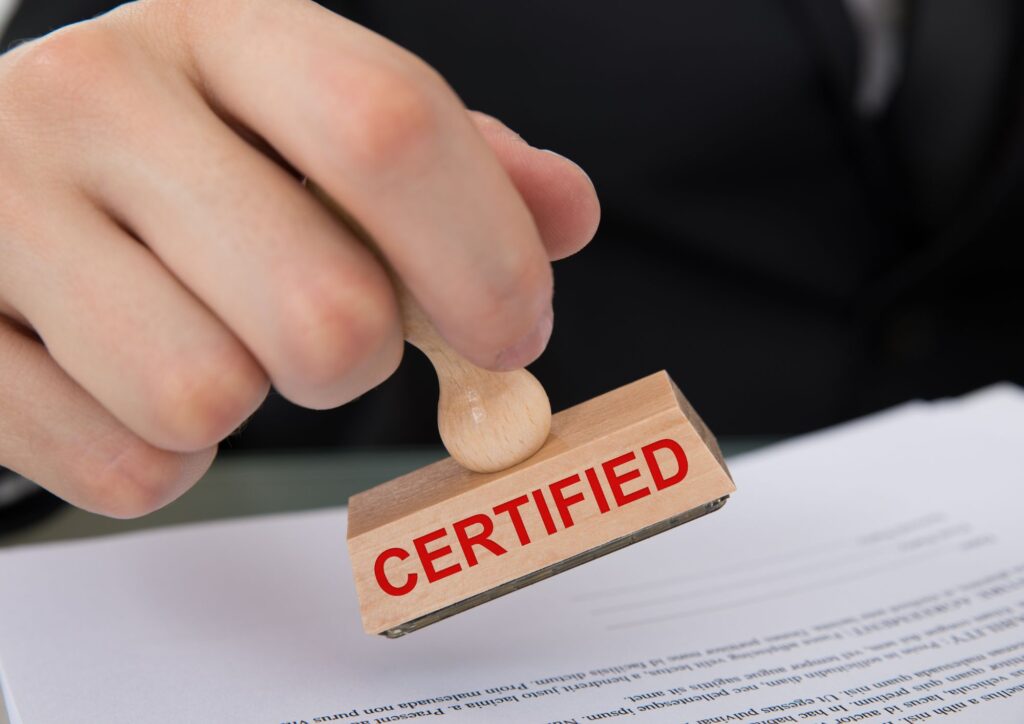A complete guide to understanding their purpose, legal value, and how to choose the right provider
In our interconnected world, the demand for official and legally recognized document translation has grown significantly. From immigration processes and academic applications to international business and legal affairs, the ability to present documents in another language—while maintaining their full legal validity—is essential. That’s where certified translation services come into play.
But what exactly is a certified translation? When is it necessary? And how can you ensure that the service you choose meets all legal and quality requirements? In this article, we explore these questions in depth and offer practical guidance to help you navigate this critical area of professional translation.

What are certified translation services?
A certified translation is a translated document accompanied by a signed statement from the translator or translation agency affirming that the translation is complete and accurate to the best of their knowledge and ability. This certification is typically required for official documents submitted to legal, academic, or governmental authorities.
Certified translation services differ from regular translation in several important ways:
- They involve a formal declaration of accuracy and completeness.
- They are often signed and dated, and in some jurisdictions, must be notarized or accompanied by a sworn translator’s credentials.
- They may require specific formatting, seals, or documentation depending on the institution or country requesting them.
In short, a certified translation is not just a linguistic service—it’s a legal instrument.
When do you need certified translation services?
Not all translations need to be certified. But when legal recognition is at stake, certified translations are often non-negotiable. Here are some common situations in which certified translation services are required:
1. Immigration procedures
When applying for visas, residency, or citizenship, most immigration authorities require translated documents—such as birth certificates, marriage certificates, or police clearances—to be certified.
2. Academic enrollment abroad
Universities and educational institutions often demand certified translations of academic records, diplomas, and transcripts as part of their admissions process.
3. Legal proceedings
Court cases may require certified translations of contracts, evidence, statements, or other legal documents to be accepted as valid in proceedings.
4. Business registration and international compliance
Registering a company abroad or complying with foreign regulations frequently involves submitting certified translations of corporate bylaws, tax documents, or licenses.
5. Medical and insurance documentation
In health-related matters, certified translations of medical records, insurance claims, or clinical reports may be requested to ensure accurate interpretation of vital information.
In all these scenarios, certified translation services ensure that translated documents meet the necessary standards for formal acceptance.
Key elements of a certified translation
For a translation to be considered “certified,” it typically includes:
- A signed certificate of accuracy, declaring that the translation is faithful and complete.
- The name and contact information of the translator or agency.
- The date of certification.
- In some cases, a stamp, seal, or signature by a sworn translator or notary.
Requirements vary from one country or institution to another. For example, in the United States, a notarized translation may be needed in addition to certification, while in countries like Spain or France, sworn translators must be appointed by a government authority.
This is why working with professional certified translation services is critical—they understand the legal standards and formats required for each jurisdiction.

Risks of using uncertified or unqualified translators
Choosing the wrong provider for a certified translation can lead to serious consequences, including:
- Rejection of documents by immigration offices, courts, or universities.
- Delays in processing due to the need for retranslation.
- Legal issues stemming from inaccuracies or inconsistencies.
- Wasted time and money due to having to repeat the entire process.
To avoid these problems, it’s important to ensure that your certified translation services are delivered by qualified professionals who understand both the linguistic and legal demands of the task.
How to choose the right certified translation provider
Not all translation agencies offer certified services, and not all translators are authorized to provide them. When selecting a provider, look for:
1. Relevant experience and credentials: Choose an agency or translator with a proven track record in providing certified translation services, especially for the type of document you need translated.
2. Knowledge of local requirements: A good provider will understand the specific requirements of the institution or country receiving the translation—and tailor the format accordingly.
3. Clear turnaround times and confidentiality: Certified translations often involve sensitive information and tight deadlines. Make sure the provider has clear policies on data protection and delivery schedules.
4. Language pairs and specialization: Ensure the provider works with native speakers of the target language and has expertise in the subject matter—whether legal, medical, academic, or technical.
5. Transparent pricing: A professional agency will provide clear quotes, outlining what’s included (e.g., notarization, mailing of hard copies, sworn translation) and what costs extra.
Working with reliable certified translation services is not just about getting the translation done—it’s about doing it right the first time.
Certified vs. sworn vs. notarized translation: what’s the difference?
These terms are often confused but represent different types of official translation, depending on the legal framework:
- Certified translation: A translation accompanied by a signed statement of accuracy from the translator or agency.
- Sworn translation: Performed by a translator officially authorized by a government (common in Spain, France, Italy).
- Notarized translation: A certified translation that has been notarized by a notary public to authenticate the translator’s identity.
Depending on your destination country or the institution involved, you may need one, two, or all of these elements.
If you’re unsure, professional certified translation services can advise you on which format is legally acceptable.
The added value of working with professionals
Beyond fulfilling legal requirements, certified translations done by professionals offer peace of mind. They ensure:
- Accuracy, which is essential in legal, medical, and official documents.
- Credibility, enhancing your professional or personal reputation.
- Time efficiency, thanks to streamlined processes and experienced staff.
- Support, including consultations and guidance for international processes.
A good translation partner doesn’t just translate—they help you succeed in your global goals.

When legal acceptance, academic progress, or business success is on the line, accuracy and professionalism in document translation are non-negotiable. Certified translation services are your safeguard against errors, rejections, and costly delays.
By choosing a qualified, experienced provider, you’re not just translating a document—you’re ensuring that it holds the same legal and official value as the original. Whether you’re navigating immigration, applying to a university, or expanding your company abroad, make certified translation a part of your global strategy.
Because when it comes to official documents, only a certified translation will do.
